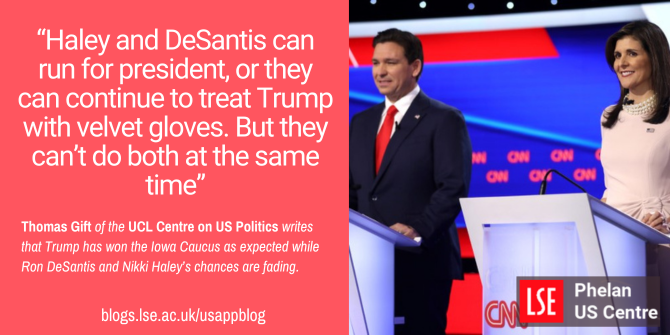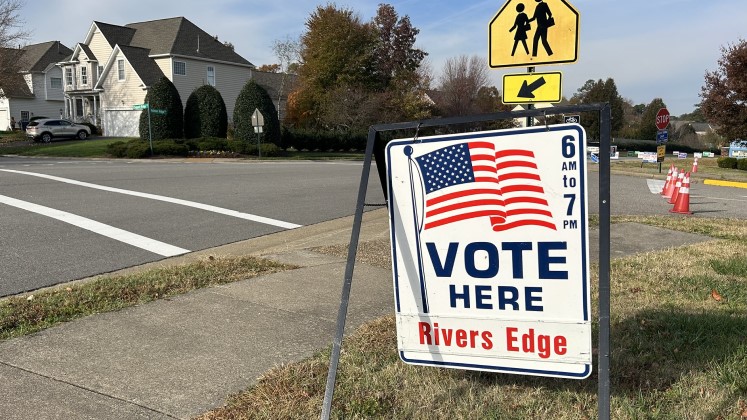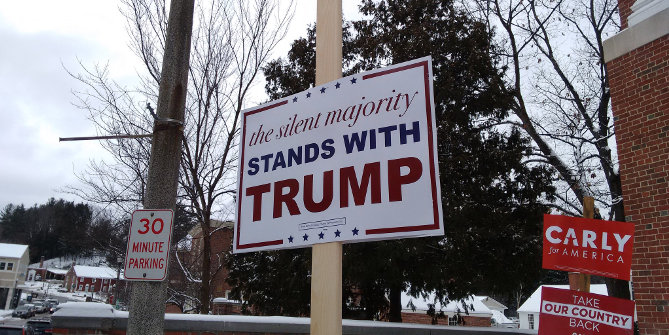 Donald Trump dominated the first-in-the-nation Iowa caucuses last night, solidifying his position as the favorite to be the 2024 Republican nominee for president. In this Q&A, Thomas Gift offers key take-aways from the results, explains why Iowa is just the beginning of a likely Trump coronation, and analyzes why it’s unlikely that Nikki Haley or Ron DeSantis will be able to blunt the former president’s momentum.
Donald Trump dominated the first-in-the-nation Iowa caucuses last night, solidifying his position as the favorite to be the 2024 Republican nominee for president. In this Q&A, Thomas Gift offers key take-aways from the results, explains why Iowa is just the beginning of a likely Trump coronation, and analyzes why it’s unlikely that Nikki Haley or Ron DeSantis will be able to blunt the former president’s momentum.
What were your main impressions from watching Trump’s win last night in Iowa?
Even more than before, it seems like the odds of an upset in the Republican primaries are about the same as Trump admitting that he lost the 2020 election. It’s just hard to imagine it. FiveThirtyEight polling show that, nationally, Trump is at 63 percent, and Haley and DeSantis are both at 12 percent. That’s a gargantuan lead. No one in more than 40 years has taken that kind of margin into a contested primary fight and not become the nominee. The last time we saw a candidate with an even comparable number was George W. Bush, who was polling at about 60 percent in 2000 when he beat John McCain. So, Trump has all the tail winds at his back. After Iowa, you could argue that complacency could become an issue if Trump looks like he has the nomination wrapped up. One of the less talked about aspects of Iowa is that overall turnout was considerably down from 2016 (although it’s possible that much of that could have just been due to the bad weather). At the same time, Trump voters are enthusiastic. When you think about who’s most likely to show up to vote even when the outcome of the race looks preordained, it’s the true believers. If MAGA means anything, it means true believers.
Why has Trump been so successful at monopolizing the conservative vote?
There’s a whole sociology on why Trump has the GOP in a headlock. While there’s not just one cause, I think what Trump’s landslide in Iowa implies, fundamentally, is that grievance politics work. Before Trump, the term deep state wasn’t part of the political lexicon. Neither were accusations about the weaponization of the legal system. But with the 91 criminal indictments, and with the effort to kick Trump off the ballot in Colorado and Maine, Trump has over and over depicted himself as the victim. But he’s done more than that. He’s also presented himself as the martyr for a whole class of Americans who also see themselves as victimized: blue collar workers in post-industrial towns whose jobs have been gutted by automation and trade; evangelical Christians who think their traditional way of life is under assault; and white suburbanites who feel alienated by rapid demographic change. Trump’s basic message is: “when they come after me, they’re really coming after you.” There’s a palpable sense among right-wing voters that Trump represents them in a way that other politicians don’t. And so everything else, the tweets, the criminality, the demagoguery, the taxing an ax to the constitution—all of that fades into background.

“Ron DeSantis & Nikki Haley” (CC BY-SA 2.0) by Gage Skidmore
Do you expect former South Carolina Governor Nikki Haley or Florida Governor Ron DeSantis to attack Trump more directly now, as their chances of toppling him seem to be fading?
Haley and DeSantis can run for president, or they can continue to treat Trump with velvet gloves. But they can’t do both at the same time. Still, I don’t expect the kind of relentless, knives out, sharp attacks on Trump that we saw from former New Jersey Governor Chris Christie, for example. The real challenge for Republican candidates right now is that they don’t want to be seen as “establishment”—the kind of mushy conservatives who appeal to talking heads on CNN or MSNBC. Haley and DeSantis both know that courting moderates and parroting lines of attack against Trump that you could read in the New York Times isn’t how to win over right-wing voters who make up the bulk of the Republican primary base. The other aspect of this that’s not stressed enough is that provoking Trump isn’t costless. Attacks on the former president are going to elicit a counter-response. If Haley or DeSantis start to go negative on Trump, he’s going to kick it back exponentially harder. It’s not clear to me that it’s smart to get into a mudslinging contest. That’s particularly true if you’re courting Trump 2016 and Trump 2020 voters who might be open to a new choice, but who are still basically favorable to him.
Is there any scenario in which DeSantis or Haley could still make a race out of this primary fight?
If DeSantis didn’t place second last night, I think his campaign would be effectively dead. It still might be. He really staked his chances on Iowa, spent most of his money there, and invested considerably in his ground game. While last night’s runner-up finish was a consolation, it was far from convincing. Haley is in a different spot. Iowa wasn’t as much do or die. The consensus it that her fortunes are more wrapped up into New Hampshire next week. She received the endorsement there of popular governor Chris Sununu. She has a major get-out-the-vote apparatus in the state. And she’s got serious super PAC money that’s helping to keep her campaign afloat. But most of all, the demographics of New Hampshire just suit Haley better. She’s dominating with registered independents who can vote in that primary. But even if Haley emerges as the main Trump alternative, it’s an uphill battle. Heading into Super Tuesday, she’ll be encountering more hardline Republican voters in states like Arkansas and Alabama who think she’s the “globalist,” “Republican in Name Only” candidate that Trump says she is. So, if this fight does turn into a long slog of just delegate accumulation, I still think it’s advantage Trump.
- These remarks are based in part on an interview by Thomas Gift for BBC News on January 16, 2024.
- Please read our comments policy before commenting.
- Note: This article gives the views of the author, and not the position of USAPP – American Politics and Policy, nor the London School of Economics.
- Shortened URL for this post: https://bit.ly/3HkmSVZ






